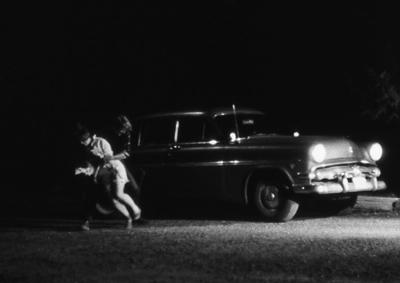Director J.L. Anderson’s remarkable first—and only—feature, Spring Night, Summer Night has been claiming the attentions of a growing number of critics as it has gradually emerged from a decades-long obscurity following screenings, in recent years, at the Museum of Modern Art and the Rural Route Film Festival. This stunning new restoration promises to bring the film an even wider audience and will no doubt be seen as one of the great re-discoveries of this year’s UCLA Festival of Preservation.
Shot on location in rural southeastern Ohio, its rolling hills shimmering in eddies of black-and-white grain, accentuated by the film’s low-key lighting, Spring Night brings an earthy poetry to its death trap portrait of small town America. In the clamor at the family dinner table, Carl (Ted Heimerdinger) and Jessie (Larue Hall), the eldest children in an extended brood, see the grinding trajectory of their lives laid out: from carefree youth to embittered adulthood to forgotten old age. Both, secretly, hungering for escape, they rebel against the ties that bind them to this place and to each other through an illicit act of love that brings both tender and traumatic consequences. Through these young ill-fated lovers and the hardscrabble world around them, Anderson captures in almost ethnographic detail the postwar bust of the Appalachians where regrets and recriminations are soaked in Blatz and fuel a pernicious rumor mill. This last, seemingly the town’s last booming industry, ironically offers Carl and Jessie a glimmer of hope in their impossible situation (they may not actually be related).
The galvanizing effect of Anderson’s lone directing credit comes not only from the power of his images and themes, but also from the mere fact of its existence. Writing in Sight & Sound, Archive senior preservationist Ross Lipman situates Spring Night along with Kent MacKenzie’s The Exiles (1961), Barbara Loden’s Wanda (1970), Charles Burnett’s Killer of Sheep (1979), and Billy Woodberry’s Bless Their Little Hearts (1984) to expand what he describes as “an unknown and completely accidental—but surprisingly coherent—body of American neo-realism.” Village Voice, on the other hand, declared it “the missing link between Shadows and The Last Picture Show.” Dropped from the line-up of the 1968 New York Film Festival in favor of John Cassavetes’ Faces and with no other options for distribution, the film was picked up by exploitation distributor Joseph Brenner who tacked on some nude scenes and released a bastardized version under the title Miss Jessica is Pregnant. The restored version screening here is Anderson’s original cut, ready to take its place, finally, among the pantheon of American independent cinema. —Paul Malcolm
Production: Triskele Limited. Producer: Franklin Miller, J.L. Anderson. Director: J.L. Anderson. Screenwriter: Doug Rapp, Franklin Miller, J.L. Anderson. Cinematographers: David Prince, Brian Blauser, Art Stifel. Editors: J.L. Anderson, Franklin Miller. Cast: Larue Hall, Ted Heimerdinger, Marjorie Johnson, John Crawford, Betty Ann Parady. 35mm, b/w, 82 min.
Restored from a 35mm print and the original 35mm track negative. Laboratory services by The Stanford Theatre Film Laboratory, Audio Mechanics, NT Picture and Sound, Simon Daniel Sound. Special thanks to: J.L. Anderson, Franklin Miller, Peter Conheim.






 Mobile Navigation
Mobile Navigation

